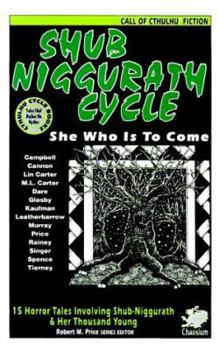The Shub-Niggurath Cycle: Tales of the Black Goat with a Thousand Young
(Part of the Chaosium's Call of Cthulhu books Series)
Call of the Cthulhu series This description may be from another edition of this product.
Format:Paperback
Language:English
ISBN:1568820178
ISBN13:9781568820170
Release Date:January 1994
Publisher:Chaosium
Length:260 Pages
Weight:0.15 lbs.
Dimensions:0.7" x 5.5" x 8.6"
Customer Reviews
3 ratings
Goat's Head Soup
Published by Thriftbooks.com User , 19 years ago
As usual with any anthology, you like some of it, you don't like other parts. But this edition of Chaosium's series is better than most. As usual, you get the pre-Lovecraft influences in a trio of ghost stories. I enjoy these late-19th/early 20th century curiosities. I intend to look for more of these gems in other anthologies. Ramsey Campbell's "Moon Lens" is out and out imitation Lovecraft. But if you didn't like tales Lovecraftian, why would you buy this? Richard Tierney's Simon of Ghitta stories are Lovecraft meets Sword and Sorcery and "Seed of the Star-God" is one of the best in the book. Again, this story has put Chaosium's collection of Tierney's stories high on my 'must read' list. There are several stories that show how the Lovecraft mythos can be used to inspire other stories (Harold's Blues, Grossie) without resorting to the ancient monsters. And others, like Will Murray's entry that take the usual Cthulhoid creatures in new directions. Robert Price's introduction and story notes are, as always, thought-provoking and informative. Here's hoping that Chaosium and Price don't run out of stories too soon.
O, THE HORROR OF IT!
Published by Thriftbooks.com User , 23 years ago
"The Shub-Niggurath Cycle" is a veritable morass of pedestrian plotting, derivative imagry, and tepid writing. All the defects of Lovecraft worship are painfully evident: obsessive codifying of the Mythos, cosmic pretentions, dream sequences featuring weird geometric angles, silly names, and masses of writhing tentacles. Lin Carter's execrable "Dreams in the House of Weir" and his attached doggrel are the nadir of the anthology. Of course, Carter's work always has a way of tainting anything near at hand. The book, however, is redeemed by a single tale: "Harold's Blues" by Glen Singer. Singer's story is a sly and witty Faustian redux which intermingles a fictionalized version of the murky career of real-life, real dead bluesman Robert Johnson with the Cthulu Mythos. The dialect of the narrator is excellent in terms of its understated subtlety and consistency. Singer utilizes the Mythos as it should be used -- as a murky, wicked backdrop that overpowers the actions of genuine characters with lives of their own. There is an insidious, doomed atmosphere which is far more effective than somnambulating trudges through cyclopean, extra-terrestrial ruins or "weird doings" in the dank cottages of unsuspecting professors. "Harold's Blues", then, is nothing short of a pearl in the swine slop and by its strength alone, this anthology rates four stars.
ïa! Shub Niggurath!
Published by Thriftbooks.com User , 24 years ago
Shub Niggurath, the black goat of the wood with a thousand young, is mearly hinted at in H.P. Lovecraft's fiction. Mentioning little more then the name and appellation, old Shubby is shrouded in mystery. Price has compliled here some of the works which have followed Lovecraft's scant clue to define Shub Niggurath. Price includes one of his own stories, a tale sexual decadence, perversion and madness in the name of Shub Niggurath which, of itself, makes the book worth reading.






